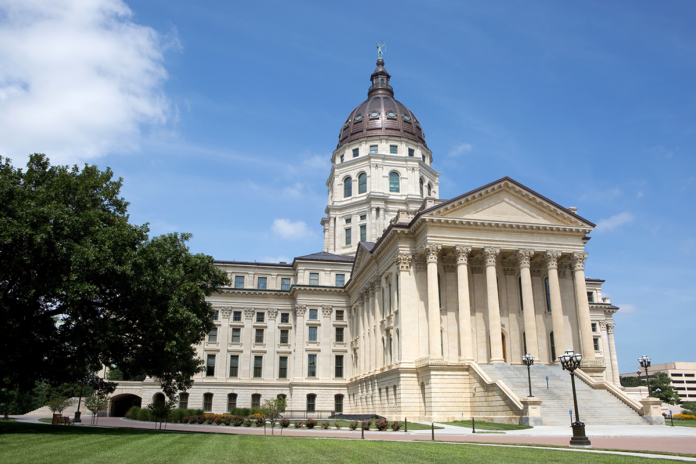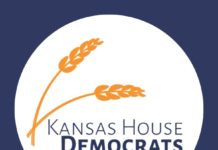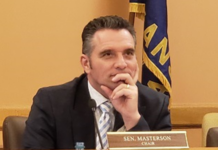(Updated to correct the grades for the financial literacy course)
Well, we’re now at about the three-quarter pole with a lot of legislative work out of the way as we head down the home stretch.
With so much work already done, here’s a look at the 50 major pieces of legislation that have been debated, passed or killed this year so far. We think we got to all of the big stuff, and this will likely grow by the time we redo it in May.
If there’s anything you think we missed, drop us a line, although this list will likely grow after the wrapup session.
American civics test/financial literacy: The Legislature approved a bill requiring Kansas students to pass an American civics test to graduate from high school. It also requires a personal financial literacy course for grades 10 through 12 that would last at least one semester or two quarters. Students wouldn’t have to pass the civics test until the 2022-23 school year. It would require students to pass the financial literacy course
for graduation starting in the 2024-2025 school year. The House passed the bill 72-51. It was approved 25-13 in the Senate. The bill now goes to Democratic Gov. Laura Kelly.
Angel investor tax credit: The bill renews the economic development incentive for small, innovative startup companies for five years, until 2026. The bill increases the tax credits received from an investment in a single business to $100,000 from $50,000. It also increases the total yearly tax credits received for an investor to $350,000 from $250,000. The bill passed the House on a 109-12 vote. The Senate passed the bill 29-9. The governor has signed the bll into law.
Automated delivery vehicles: A bill authorizing Amazon to operate automated delivery vehicles on city sidewalks passed out of a Senate committee but died on the floor. The bill was facing opposition from labor unions, which thought it would displace jobs. The legislation is expected to return next year.
Ballot collection: The Kansas Legislature passed a bill that limits the delivery of ballots to election offices on behalf of someone else. The bill limits to 10 the number of ballots a person can deliver to the election office on behalf of someone else during an election. It would be a misdemeanor offense. As originally drafted, the bill prevented an individual from delivering more than five advance voting ballots on behalf of other voters during an election and it would have been a felony. The bill passed the Senate on a 27-11 vote. It passed in the House 80-42. The governor vetoed the bill.
Budget: The Legislature passed a $21.4 billion budget for fiscal year 2021 and a $15.4 billion budget for fiscal year 2022. The big difference between the two budgets? The $5.8 billion education budget is separate from the bill. It is packaged together with other bills aimed at promoting school choice with public subsidies for struggling students to attend a private school. A proposal for a 2.5% salary increase at a cost of about $31.5 million has been delayed as well. The budget also says no money can be used to enforce a statewide mask mandate. The House passed the budget 71-52. The Senate approved it 21-14. It has been sent to the governor.
Business compensation: Two bills bogged down in committee. One bill could provide as much as $500 million in relief to Kansas businesses that were shut down during the COVID-19 pandemic. It calls for allocating 25% of federal COVID-19 relief funding going to the state and local governments to offset financial damage suffered by businesses affected by stay-at-home orders during the pandemic. Another bill proposed by Sens. Tom Holland and Mark Steffen would give businesses affected by pandemic shutdowns and restrictions a property tax rebate capped at $7,500. It remains to be seen what happens with these bills during the wrapup session.
Carl Folsom III nomination for state appeals court: Gov. Laura Kelly’s nomination to the Kansas Court of Appeals came up three votes short of winning confirmation to the bench in an 18-17 vote, including three present and not voting. It was the second time the Senate refused to confirm Folsom’s nomination to the bench.
Cellphones and driving: New limits proposed for drivers using cellphones, including a ban for anyone under 18 and for the general public in construction and school zones, advanced out of a Senate committee. It wasn’t considered by the full Senate.
Child advocate office: The Senate approved a bill to create an office that would deal with child welfare complaints. The Senate voted 31-4 to approve the bill. It awaits action in the House.
Concealed carry age: The Kansas Legislature passed a bill that lowers the age for carrying a concealed weapon to 18. State law already allows someone as young as 18 to carry a gun, but the bill would allow anyone from 18 to 20 to get a license to carry a concealed weapon. The bill passed the Senate 30-8. The House passed the bill 80-43.
Constitutional amendent on abortion: The Legislature passed a constitutional amendment overturning a 2019 state Supreme Court decision that found that Kansans have a fundamental right to an abortion. It goes to the voters in August 2022. The Senate passed the bill 28-11. It passed in the House 86-38.
Constitutional amendment on citizen grand juries: A proposal that would write citizen grand juries into the Bill of Rights of the state constitution was heard in a Senate committee but didn’t advance. Kansas is just one of six states that allow citizens to request grand juries through petitions. They’ve been used to investigate abortion clinics, poronography, the Board of Public Utilities in Wyandotte County and even former Secretary of State Kris Kobach.
Constitutional amendment on convention of states: A proposal asking Congress to call a constitutional convention to place limits on the federal government was heard in a Senate committee but did not advance. The resolution sought to have Congress call a convention of states under Article V of the U.S. Constitution. The convention would be held for the purpose of imposing fiscal restraints and limiting the power and jurisdiction of the federal government, as well as limiting the terms of members of Congress.
Constitutional amendment on rules and regulations: A proposed constitutional amendment giving the Legislature the power to veto rules and regulations adopted by executive branch agencies moved out of a House committee but has not been acted on by the full Legislature. This bill was announced earlier this year by Attorney General Derek Schmidt and Republican leadership in the Legislature.
E-Verify: The state budget would require state agencies and contractors to verify the eligibility of their employees to work in the United States. State agencies and major contractors would be mandated to use E-Verify, a U.S. Department of Homeland Security website that allows businesses to determine the eligibility of their employees to work in the United States. The bill requires all state agencies to enroll in E-Verify to determine whether employees hired after Jan. 1, 2022, are eligible to work in the United States. It would apply to state contractors that do at least $50,000 worth of business with the state to verify the eligibility of their employees.
Education bill: A bill that coupled the public education budget with two programs intended to encourage school choice with public subsidies for private schooling passed the House but came up a vote short in the Senate. The bill deadlocked at 20 in the Senate and passed 64-59 in the House
Election Day mail ballot deadline: A bill eliminating the three-day grace period for mailing in ballots is still sitting in a Senate committee after it was initially advanced and later pulled back. Its future is uncertain. The law now allows advanced ballots to be delivered to election officials up until three days after the election so long as they’re postmarked on or before Election Day. The bill set the deadline at 7 p.m. on Election Day.
Emergency management law: The Legislature passed a bill rewriting the state’s emergency management law, which included provisions allowing aggrieved individuals to go to court if they feel they are overly burdened by government regulations. The House passed the bill 118-5. It passed 31-8 in the House. The bill was signed into law.
Energy choice: The Legislature passed a bill banning Kansas cities and counties from restricting public access to natural gas. The Kansas House voted 93-29 to approve the bill. It passed on a 30-10 vote in the Senate. The bill was aimed at undercutting a national trend toward banning natural gas hookups as local governments fight climate change and fossil fuel emissions. The governor allowed it to become law without her signature.
Firearm safety: The Legislature passed a bill requiring the state Board of Education to develop guidelines for gun-safety courses that would include the National Rifle Association’s Eddie Eagle GunSafe program. The bill requires the board to write a standardized firearms education program under certain conditions that a local school board could implement if it chooses. The legislation passed 31-7 in the Senate and 79-44 in the House. The governor vetoed the bill.
First-time home buyers: A bill providing a tax deduction for first-time home buyers has passed the House and is awaiting action in the Senate. The bill, which passed 119-3 in the House, allows Kansans to set up savings accounts at financial institutions starting July 1, 2022, to save for the purchase of a new home. Contributions would be limited in each tax year to $3,000 for individuals and $6,000 for a married couple filing a joint return. The deposits would be capped for all tax years at $24,000 for individuals and $48,000 for a married couple filing a joint return.
Gadsden license plate: The Legislature passed a bill authorizing the Gadsden flag —known for its coiled snake and “Don’t Tread on Me” motto — as a distinctive state license plate. The bill became controversial after some lawmakers objected to the background of the flag’s designer, Christopher Gadsden, a South Carolinian who owned two rice plantations with slaves but played a prominent role in the American Revolution. The bill not only authorized the Gadsden flag but also distinctive Braden’s Hope for Childhood Cancer license plates, proud educator license plates, Alpha Kappa Alpha license plates and Delta Sigma Theta plates. The bill passed 81-41 in the House and 29-5 in the Senate. The Senate voted 26-11 against removing the Gadsden plate from the bill. The governor vetoed the bill.
Indigenous persons: The Kansas Legislature passed a bill authorizing the attorney general to coordinate law enforcement training in dealing with missing and murdered Indigenous persons. The bill passed unanimously in the House and Senate. It’s been signed into the law by the governor.
Infrastructure trespassing: Gov. Laura Kelly signed a bill intended to protect critical infrastructure from destructive protests and criminal damage. The bill increases penalties for trespassing or damaging critical infrastructure. It passed 82-42 in the House and 37-2 in the Senate. The bill was backed by the petrochemical industry, which said in testimony the increased penalties are essential to safeguarding sensitive infrastucture critical to the economy. Critics said it would outlaw peaceful protests.
Labor Department oversight: The Kansas Legislature passed a bill creating a committee to provide more oversight of the Kansas Labor Department, which has faced criticism in recent months over how it handled a flood of unemployment claims during the COVID-19 pandemic. The bill also would put at least $250 million into the unemployment trust fund that would cover any unemployment fraud, which is estimated at somewhere between $300 million and $600 million. The bill potentially allocates another $250 million depending on how much fraud an independent audit finds. The bill passed unanimously in both chambers. The governor praised the bill.
Mask mandate for House members: The House voted down a proposal requiring lawmakers to wear masks covering their mouths and noses when in the House chamber and during House committee meetings. The House voted 75-46 against the rule.
Medicaid expansion: Efforts to expand Medicaid this session fell short in the House and the Senate. Senate Minority Leader Dinah Sykes tried to amend a bill to expand Medicaid, but it was defeated 23-12. Demoratic Rep. Brett Parker tried a similar approach in the House, but his proposed amendment to the state budget was voted down 78-46.
Medical marijuana: A bill legalizing medical marijuana in Kansas was passed out of committee to the House floor. It was later returned to the committee for more work.
Nursing home liability: Gov. Laura Kelly signed into law a bill that provides immunity from civil liability for COVID-19 claims for adult care homes, community mental health centers, crisis intervention centers, community service providers and community developmental disability organizations. The House approved the bill 85-37. The Senate approved the bill 30-7.
Occupational licensing: Kansas lawmakers passed a bill making it easier for members of the military or their spouses to get occupational licenses when they move to Kansas. The bill requires state licensing agencies to issue the appropriate credentials to a military service member or their spouse — who are already licensed out of state — within 15 days from the date of the submission of a “complete application” or within 45 days for all other nonmilitary applicants from out of state. Currently, credentials are to be issued to military service members and spouses within 60 days. The bill passed the House 105-17. The Senate approved the bill on a 35-4 vote. The governor signed the bill.
Parks & Wildlife surveillance: The House rejected a bill prohibiting law enforcement personnel from the Kansas Department of Parks, Wildlife and Tourism from conducting surveillance on private property unless authorized by a search warrant.
Property tax transparency: Gov. Laura Kelly signed a bill that puts limits on the longstanding practice of local governments collecting extra revenue without raising the property tax rate. The bill requires local governments to hold hearings and vote to accept extra revenues coming from increased property values even if the tax rate remained steady. The legislation eliminates the controversial property tax lid that the Legislature imposed in 2015 and started in 2017. The bill passed 30-5 in the Senate and 120-3 in the House.
Public defender pay: A bill raising the salary cap for public defenders from $80 to $100 through June 30, 2023, and to $120 after July 1, 2023, passed the House and was waiting action in the Senate. The bill passed the House 116-8. Here’s coverage explaining why the bill is needed.
Promise Act: The bill establishes a program to provide scholarships for students to attend any community college, technical college or independent not-for-profit postsecondary institution. Scholarships would be offered to Kansas graduates who agree to complete a certificate or two-year program in one of the state’s high-need areas for labor. Participating students must work part time or perform community service during their education and commit to remaining in Kansas post-graduation. The program would cost $10 million a year. The bill passed the House 118-4 and unanimously in the Senate. It has been sent to the governor.
Reamortization: Unlike in previous years, the Legislature did not vote on the governor’s request to refinance payments to the state’s retirement system in an effort to free up state general fund dollars for the budget. There were two bills — one in the Senate and one in the House — that didn’t go anywhere this year. The House tax commttee advanced the bill without recommendation and was never acted on.
Robin Marx nomination for tax appeals board: The Senate voted 27-11 against Gov. Laura Kelly’s nomination of career appraiser Robin Marx to the Kansas Board of Tax Appeals.
Rural opportunity zones: This bill would extend for two years a program that offers a mix of tax cuts and student loan assistance as a way of stanching the loss of population in rural Kansas. The bill would make any county with a population of up to 40,000 people eligible for the program. The bill would increase the number of eligible counties from 77 to 95. It is now part of a conference committee report that awaits action.
Securitization: Gov. Laura Kelly signed into law a bill that creates a means for utilities to use ratepayer-backed bonds that could potentially expedite the retirement of coal-fired power plants. The bill also allows natural gas companies to issue bonds to cover their extraordinary fuel costs incurred during the deep freeze in February. It allows the gas companies to spread out repayments of their expenses and ultimately save ratepayers money. The House passed the bill 113-9. It passed the Senate 33-7.
Social services reorg: For the second straight year, the Legislature rejected Gov. Laura Kelly’s proposal to bring together social services under one umbrella. The House voted 84-38 against combining the Department for Children and Families and the Department for Aging and Disability Services. Only one chamber needed to vote the reorganization down.
Sports wagering: The future is in doubt after the House failed to pass a bill authorizing sports wagering during the regular session. The Senate voted 26-12 to pass a bill that’s very different from the House legislation. Here’s a recap of what’s happened.
Spousal battery exemption: A bill removing the spousal exception for sexual battery passed the House 110-13. Supporters of the bill said it sends a message “that violence is no less harmful when it happens at the hands of someone a victim loves and trusts.” The bill was added to a conference committee report that is expected to be voted on when the Legislature convenes next month.
STAR Bonds: The Legislature renewed this tax incentive until 2026. The bill adds new business headquarters to the types of facilities eligible for the incentive. The bill also adds a “rural redevelopment project” to the list of eligible projects for STAR Bonds. A rural redevelopment project is defined as one that’s not in a city with a population of more than 50,000; has regional importance; has a minimum of $3 million in capital investment; and would enhance the quality of life in the community and region. The Senate passed the bill 30-9. It was passed in the House 101-23. The governor has signed the bill into law.
Statewide mask mandate: The House and Senate each voted to oppose Gov. Laura Kelly issuing a new statewide mask mandate after her COVID-19 related executive orders lapsed at the end of March. The House and Senate each voted on separate resolutions to oppose new executive orders for masks. The House vote 84-39 for its resolution opposing the mandate. The Senate also voted for its resolution opposing the mandate 29-11.
Taxes: The Legislature passed a tax bill that could cost the state treasury almost $300 million over three years. It was a far less expensive alternative to a similar bill that the Senate passed costing more than $1 billion over three years. The House voted 81-43 to approve the bill, while the Senate approved the legislation 30-10. The governor is now deciding whether to sign or veto the legislation. The bill could be complicated by a twist in federal law that allows businesses to deduct expenses covered with the tax-free Payroll Protection Program loans. Kansas conforms with federal tax law, which means this could cost the state millions in revenue. The governor vetoed the bill.
Tourism reorg: The Legislature green-lighted Gov. Laura Kelly’s proposal to move tourism back to Commerce like it was before 2011, when former Gov. Sam Brownback shifted the department over to the Department of Wildlife and Parks. Commerce officials said it made more sense to have tourism be part of the Commerce Department. Commerce markets the state as a place to live and work. Tourism, in a separate department, markets the state as a place to visit. The Legislature allowed the reorganization to take place without a vote.
Transgender athletics: Kansas joined a handful of states passing a bill banning transgender girls and women from participating in interscholastic sports for females. The Kansas House voted 76-43 for the bill with six lawmakers absent and not voting. It passed 26-11 in the Senate with three present and not voting. The bill now goes to Democratic Gov. Laura Kelly, a staunch advocate of the LGBTQ community who took steps to allow transgender people to change their birth certificates consistent with their gender identity. The governor vetoed the bill.
Utility poles: The Legislature approved a bill requiring Evergy to do more to make the public aware of its plans to install “urban electric transmission lines” in Wichita. The bill came in response to a storm of controversy that stemmed from the installation of 105-foot towers in the front yards of low-income residents in northeast Wichita. The bill requires utility companies to provide the city of Wichita advance notice of their intention to install the transmission lines with preliminary plans including the locations and dimensions of equipment to be installed. It passed 122-2 in the House and unanimously in the Senate. The governor signed the bill.
Utility transmission charges: A proposal intended to limit power companies from recovering electric transmission costs from consumers and saving ratepayers money failed to get out of a committee. The bill would have limited utility companies from increasing or decreasing the surcharge for electric transmission delivery that appears on a customer’s bill. Here’s what happened during the committee hearing.
Vaccines: A bill barring employers from requiring vaccines and restricting the state health secretary from requiring new vaccines for school kids is sitting in the Senate after getting out of committee. Its future is still unclear. The Senate voted 18-17 to defeat an amendment to a bill that would have prevented the health secretary from adding any new required vaccines.
Wind turbines: Legislation that would have imposed a new series of regulations for wind turbines, including setback requirements as well as studies of sound and shadow flicker, failed to get out of committee in the face of fierce opposition.
















